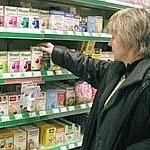You are here:
- Homepage
- Food safety
- Special food groups
- Food supplements
weitere Themen des BFR
Bereichsmenü: Food safety
Health assessment of food supplements

Food supplements are foods that
-
are intended to supplement a general diet;
-
consist of a concentrate of nutrients or other substances with nutritional or physiological action (e.g. vitamins, minerals including trace elements, amino acids, fibre, plants or herb extracts) on their own or as a combination;
-
are placed on the market in doses, particularly as capsules, powder sachets and other non-typical forms of administration of foods for consumption in small, measured amounts.
For health reasons supplements must carry information about recommended daily intake.
Food supplements are not medicinal products
In contrast to medicinal products, food supplements may not have any side-effects and must be safe like all other foods. Unlike medicinal products they do not have to be registered with the Federal Office of Consumer Protection and Food Safety (BVL). The Länder are responsible for monitoring the food supplements on sale in the shops, and the manufacturing plants.
The provisions of the Food and Feed Code (LFGB) and the Ordinance on Food Supplements apply to food supplements. There are currently no binding maximum levels for the ingredients (nutrients or other substances with nutritional or physiological action) of supplements on either the national or the European level. An EU-wide regulation on valid maximum levels for vitamins and minerals is in the process of being elaborated.
Are food supplements necessary?
In principle, food supplements are superfluous for healthy individuals on a normal diet. In a balanced diet the body has all the nutrients it needs. Normally, the additional intake of individual nutrients is not, therefore, necessary. A one-sided, imbalanced diet cannot be corrected by taking food supplements.
In some situations targeted supplementation with individual nutrients may make sense.
BfR task in conjunction with food supplements
Within the framework of its remit to ensure consumer health protection, BfR assesses food supplements that deviate from the statutory provisions in the Food and Feed Code. It advises the federal government and the Länder on questions pertaining to the safety of food supplements.
Further information on food supplements can be accessed in the BfR FAQs about food supplements.
Opinion
(15)Other documents
(4)| Date | Title | Size |
|---|---|---|
|
16.11.2005 BfR Health Assessment No. 005/2006
|
Addition of boric acid or borax to food supplements |
151.5 KB
|
|
13.01.2004 Common statement
|
Common statement of representatives of national food safety agencies and institutions involved in nutrition in the European countries and Norway |
12.9 KB
|
|
13.11.2002 |
Draft Report of the Expert Group on Vitamins and Minerals (EVM) - Comments of the BfR |
18.2 KB
|
|
18.01.2002 |
Toxicological and Nutritional Aspects of the Use of Minerals and Vitamins in Foods |
192.2 KB
|
Press releases
(14)Communication
(5)| Date | Title | Size |
|---|---|---|
|
14.05.2021 BfR Communication No. 015/2021
|
Vitamin D, the immune system and COVID-19 |
244.9 KB
|
|
14.11.2019 Communication No. 044/2019 from the BfR
|
Biotin in food supplements can influence laboratory test results |
134.9 KB
|
|
09.08.2017 BfR Communication No 018/2017
|
Outcomes of the expert discussion "Potential Effects of Caffeine on the Cardiovascular System of Children and Adolescents" |
45.9 KB
|
|
21.07.2015 BfR communication No. 021/2015
|
Dietary supplements containing dinitrophenol (DNP) can lead to severe intoxication and even to death |
64.3 KB
|
|
06.01.2015 Communication of DTU, ANSES and BfR No. 001/2015
|
More knowledge needed to ensure safe use of botanicals in food |
52.0 KB
|
